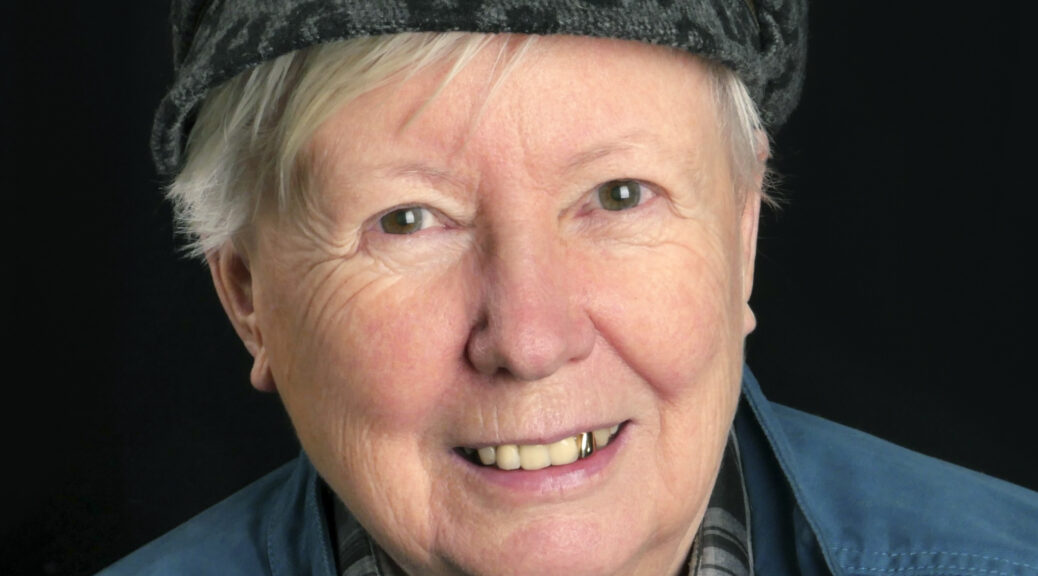JUDY GRAHN is an American poet and author born on this date. Inspired by her experiences of disenfranchisement as a butch lesbian, she became a feminist poet, highly-regarded in underground circles before achieving public fame.
A major influence in her work is Metaformic Theory, tracing the roots of modern culture back to ancient menstrual rites, though she does not regard the philosophy as exclusively feminist. Grahn teaches women’s mythology and ancient literature at the California Institute for Integral Studies and other institutions.
Judy Rae Grahn was born in 1940 in Chicago, Illinois. Her father was a cook and her mother was a photographer’s assistant. Grahn described her childhood as taking place in “an economically poor and spiritually depressed late 1950s New Mexico desert town near the hellish border of West Texas.” When she was eighteen, she eloped with a student named Yvonne at a nearby college. Grahn credits Yvonne with opening her eyes to gay culture. Soon thereafter she would join the United States Air Force. At twenty-one she was discharged (in a “less than honorable,” manner, she stated) for being a lesbian.
Grahn experienced a fair amount of homophobia during the odd jobs she did to earn money for school, trying to find housing, and was beat up for her butch attire. “These jolts taught me everything I would ever need to know about the oppression of Gay people,” she mentioned in an interview with Tongue.
At the age of 25, Grahn suffered from Inoculation lymphoreticulosis, or Cat Scratch Fever, which led to her being in a coma. After overcoming her illness, she realized that she wanted to become a poet. This realization was partially due to the abuse and mistreatment Grahn faced for being an out lesbian. Of the incident, Grahn stated “I realized that if I was going to do what I had set out to do in my life, I would have to go all the way with it and take every single risk you could take…. I decided I would not do anything I didn’t want to do that would keep me from my art.”
Grahn then moved to the west coast where she would become active in the feminist poetry movement of the 1970s. During this period, many rumors surfaced pertaining to Grahn’s weight and a possible eating disorder. Grahn attributes her thin frame to poor eating habits, smoking cigarettes, and drinking coffee.
Grahn was a member of the Gay Women’s Liberation Group, GWLG, the first lesbian-feminist collective on the West Coast, founded in 1969. Grahn and her partner, artist Wendy Cadden, produced books, poems, and graphics. This contributed the basis of the Women’s Press Collective (WPC), which strived to devote “itself exclusively to work by lesbians disfranchised by race or class”. GWLG is also responsible for founding the women’s bookstore A Woman’s Place. Grahn’s poems circulated in “periodicals, performances, chapbooks, and by word of mouth, and were foundational documents of lesbian feminism.” Her work did not extend to a commercial audience until the late 1970s; however, it garnered a wide underground audience before 1975. Carl Morse and Joan Larkin cite Grahn’s work as “fueling the explosion of lesbian poetry that began in the 70s.
Her first poetry collection, Edward the Dyke and Other Poems was released in 1971, and was combined with She Who (1972) and A Woman is Talking to Death (1974) in a poetry collection titled The Work of a Common Woman in 1978. In 1974 she held a reading of the poetry from the first two books at an event organized by the Westbeth Playwrights Feminist Collective. On A Woman is Talking to Death Grahn stated that it began “a redefinition for myself of the subject of love.” A collection of selected and newer poems, love belongs to those who do the feeling (2008) won the 2009 Lambda Literary Award for lesbian poetry.
Grahn’s poetry has been used as a source of empowerment and a way to reestablish possession of words and signs of lesbian culture that are often used as derogatory by outsiders. In a short poem from the She Who collection (1971–1972) she confidently asserts, “I am the dyke in the matter, the other / I am the wall with the womanly swagger / I am the dragon, the dangerous dagger / I am the bulldyke, the bulldagger.”
In 1997, Publishing Triangle, an association of lesbians and gay men in publishing, established the Judy Grahn Award for Lesbian Nonfiction to recognize the best nonfiction book of the year affecting lesbian lives.
In 1993, Grahn wrote her second book, Blood, Bread, and Roses: How Menstruation Created the World which focuses on menstrual rituals as the origin of human civilization by using anthropology, history, archeology, myths, and stories.[8]
In addition, lines from her Common Woman collection became “touchstones for the women’s movement in the seventies, such as ‘the common woman is as common as the best of bread/ and will rise.’
